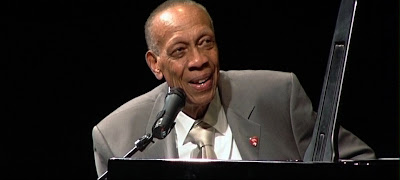 Nearing 90, the Cuban pianist Bebo Valdés is still recording and performing.
Nearing 90, the Cuban pianist Bebo Valdés is still recording and performing.Tribeca Film Festival 2008, April 23-May 4
Old Man Bebo
111 minutes
Directed by Carlos Carcas
With Bebo Valdés, Chucho Valdés, Leonardo Acosta, Omara Portuondo, and Fernando Trueba
From Spain
By Mary Lyn Maiscott
I think I went to see this movie to commune with my dad, who died 11 years ago. My father’s true loves were my mother, flying, and music, but the country of Cuba—not the least because of its own intoxicating rhythms—held a special place in his heart. He would travel there, pre-revolution, to go deep-sea fishing and nightclub hopping, and it’s very likely that one of the performers he caught was Bebo Valdés: the pianist extraordinaire who helped define the Cuban sound in the 40s and 50s, playing in bands—and sometimes acting as arranger and bandleader—in various hotels and, most notably, the legendary Tropicana nightclub.
It’s hard to imagine, what with current US-Cuba relations, that there was once a special Tropicana flight between Miami and Havana, ferrying Americans to the club and then back, with entertainers on board for a constant party. But so we learn from Carlos Carcas’s new documentary on Bebo, as everyone calls him, and his many musical and personal connections. We also find out about “Rocolas,” jukeboxes in Cuban bars that played American songs (looked down on by some local musicians); a mambo-type song form called the batanga that Bebo developed after working in Haiti (sadly, his recordings of it have disappeared); and Nat King Cole’s association with Cuba—Cole was the first black man to sing “love songs” there on TV, apparently a shock at the time, and he not only jammed with Bebo et al. but recorded an album called Cole Español.
Around the time my father stopped going to Cuba, Bebo, out of sync with Castro’s regime, fled the country. Leaving a woman who still cries when speaking of him, along with two ex-partners and several children, he went to Mexico and eventually landed in Sweden, where he found new domestic happiness but lost his previous musical fame. How he emerged from obscurity—winning two Grammys in 2002, at the age of 83—is part of the story Carcas tells, and in the telling we hear from old associates and from family members (his son Chucho is today also a famous pianist), most still in Cuba, as well as from his wife in Sweden, a land whose “pure air” Bebo credits with keeping him young, and one of the people responsible for his comeback, Spanish filmmaker Fernando Trueba (Calle 54).
These people share their memories of—and praise for—Bebo, called “Big Stallion” because he was “so tremendous,” in the words of a fellow musician. My favorite comment comes from one of his daughters, who in four decades has rarely seen her dad—he never returned to his native country—but understands what has always driven him: “I think my father breathes through his hands.” And I think my father, an amateur but spirited pianist himself, would understand that completely.
*** (3 Stars)

No comments:
Post a Comment